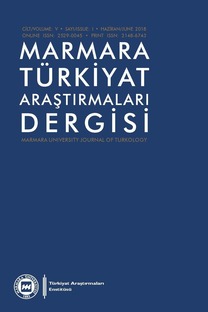Gazzâlî'nin Nasîhatü'l-Mülûk'unda Saltanat Teorisi / The Theory of Kingship in the Nasīhat ul-Mulūk of Ghāzalī (Ann K. S. Lambton)
Muhammed b. Muhammed el-Gazzâlî tarafından, Büyük Selçuklu Sultanı Muhammed b. Melikşah için yazılmış olan Nasîhatü’l-Mülûk, hukukçuların ve felsefecilerin kuramı ile sûfîlerin ahlâk anlayışını birleştirmektedir. Bu kitabında Gazzâlî yöneticiye yol gösterilmesiyle ve saltanatın pratik sonuçlarıyla ilgilenmektedir. Nasîhatü’l-Mülûk’taki kuramın temeli, dünyanın metafizik bir tasavvurudur ve onun yaptırımları ahlâkî müeyyidelerdir. Gazzâlî’ye göre, gerçek bir hükümdarın en önemli niteliği adalettir. Yönetici, mümkün olduğu kadar tebaasının memnuniyetinin peşinde koşuyor olmalı, ancak bu, Şerîat’e aykırı olarak gerçekleştirilmeye çalışılmamalıdır. O çağdaki olayların gidişatına bakıldığında, muhtemelen anarşi, Gazzâlî’ye bütün kötülükler içinde en büyüğü olarak görünmüştü. O, dönemin toplumunun durumundan açıkça rahatsızdı. Bununla birlikte, zalim bir yönetime boyun eğmenin kötülüklerini, kargaşaların riskinden ehven kabul etmektedir. Diğer yandan, sultanın görevlerini yerine getirme çabasında önem, adaleti uygulamasına verilmektedir. Yöneticinin pratik görevleri, Şerîat ile ilk İslâm toplumunun uygulaması temeli üzerinde düzenlenmiş bulunan vazifeleri değil, bunlardan çok, politik menfaat temelleri üzerine kurulu alelâde siyaset ahlâkı görevlerini içermektedir.
Anahtar Kelimeler:
Gazzâlî; Nasîhatü’l-Mülûk; Hükümdarlık; Sultan; Yönetici; Adalet; Şerîat; Ahlâk; Anarşi; Düzen; Zulüm
-
[The Nasīhat ul-Mulūk, written by Ghāzalī for the Great Seljūq Sultān Muhammad b. Malikshāh, combines with the theory of the jurists and the philosophers together with the ethic of the Sūfīs. In this work Ghāzalī is concerned with the ruler’s conduct and the practical results of kingship. The basis of the theory of the Nasīhat ul-Mulūk is a metaphysical conception of the world and its sanctions are ethical sanctions. According to Ghāzalī the most important qualification of the true sultān is justice. The ruler was to seek as far as possible the satisfaction of his subjects, but this was not to be sought contrary to the sharī‘a. In view of the contemporary state of affairs anarchy may have appeared to Ghāzalī as the greatest evil of all. He was clearly disturbed at the state of contemporary society. But he nevertheless regarded the evils of submission to an unjust government as less than the risk of disorders. On the other hand importance is attached to the exercise of justice by the sultān in the performance of his duties. The practical duties of the ruler coincide not with those set out based on the sharī‘a and the practice of the early Islamic community, but rather with ordinary political moral duties based on grounds of political expediency
Keywords:
Ghāzalī, the Naãīóat ul-Mulūk, Kingship, Sultān, the Ruler, Justice, Sharī‘a, Ethic, Anarchy, Order Injustice],
___
- Ali b. eş-Şihâb el-Hemedânî, Zahîretü’l-Mülûk, British Library, (London), Add. 7618.
- [Bosworth, C. E., “Nasīhat al-Mulūk”, EI2, VII, s. 984-987].
- Bundârî, Zübdetü’n-nusra ve nuhbetü’l-ʻusra, Recueil de textes relatifs à l’histoire des Seldjoucides, ed. M. D. Houtsma, Leiden 1889.
- [Ebû Yûsuf, Kitâbü’l-Harâc, çev. Müderriszâde Atâullah Efendi, sad. İsmail Karakaya, Akçağ Yay., Ankara 1982].
- Gazzâlî, Nasîhatü’l-Mülûk, Celâleddîn Humâî, Tahran 1315-1317hş.
- Gazzâlî, Kimyâ-u’s-Sa’âdet, taş baskı, Bombay 1314hk.
- [Gazzâlî, İhyâu’ Ulûmi’d-dîn, çev. Ahmet Serdaroğlu, II, Bedir Yay., İstanbul t.y.].
- [Gazzâlî, Yöneticilere Altın Öğütler, çev. Hüseyin Okur, Semerkand Yay., İstanbul 2004].
- Gibb, H. A. R., “al-Mavardi’s Theory of the khilāfah”, Islamic Culture, XI/3.
- Goldziher, Ignac, Muhammedanische Studien, II, London 1889.
- Grunebaum, G. E. von, Medieval Islam, Chicago 1946.
- Hamdullâh Mustevfî, Târîh-i Guzîde, ed. E. G. Browne, I, Gibb Memorial Series, Leiden 1910.
- İbnü’l-Esîr, el-Kâmil fi’t-tarîh, ed. C. Tornberg, X, Brill, Leiden 1864.
- Lambton, Ann K., “The Theory of Kingship in the Nasīhat ul-Mulūk of Ghāzalī” The Islamic Quarterly, Vol. 1, London: Islamic Cultural Centre, 1954.
- Muntecibuddin el-Cuveynî, Atabetü’l-Ketebe, ed. Abbas İkbal, Tahran 1329hş.
- Nâsıruddîn Tûsî, Ahlâk-ı Nâsırî, taş baskı, Lahor 1865.
- Necmüddîn Râzî, Mirsâdu’l-İ‘bâd mine’l-Mebde ile’l-Mi‘âd, ed. Hüseyin el-Hüseynî en-Nimetullâhî, Tahran 1312hş.
- Nizâmülmülk, Siyâsetnâme, Farsça metin, ed. Schefer, Paris 1891-1893.
- Seâlibî, Histoire des Rois des Perses, neşr. ve terc. H. Zotenberg, Paris 1900.
- Suyûtî, Câmiu’l-ehâdîs, no. 13354.
- Şihâbuddîn Sühreverdî-i Maktûl, Mûnisü’l-Uşşâk, ed. Otto Spies, Bonner Orientalischer Studien, Heft VII.
- ISSN: 2148-6743
- Yayın Aralığı: 2
- Başlangıç: 2014
- Yayıncı: Marmara Üniversitesi
Sayıdaki Diğer Makaleler
Profesör Sergey Grigoryeviç Klyaştornıy Vefat Etti (04 Şubat 1928-21 Eylül 2014)
Büyük Selçuklu Sultanlarına Ait Farsça Şiirler / Persian Poems of Saljuq Sultans
Zerdüşt Muamması / The Zoroastrian Dilemma (Jussi Aro)
Mirza Abdürrahim Talibov'un Serüveni / The Adventure of Mirza Abdurrahim Talibov
